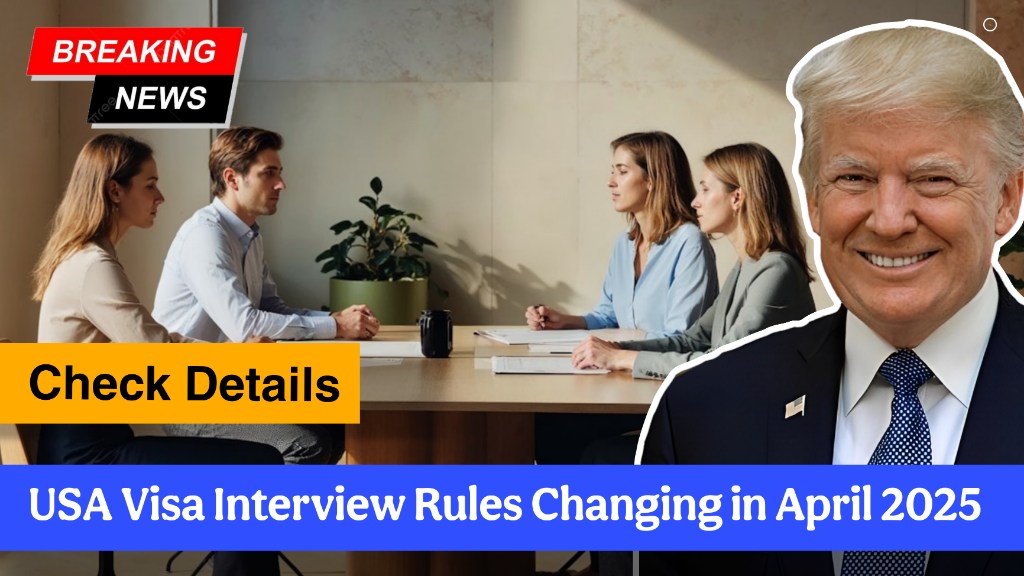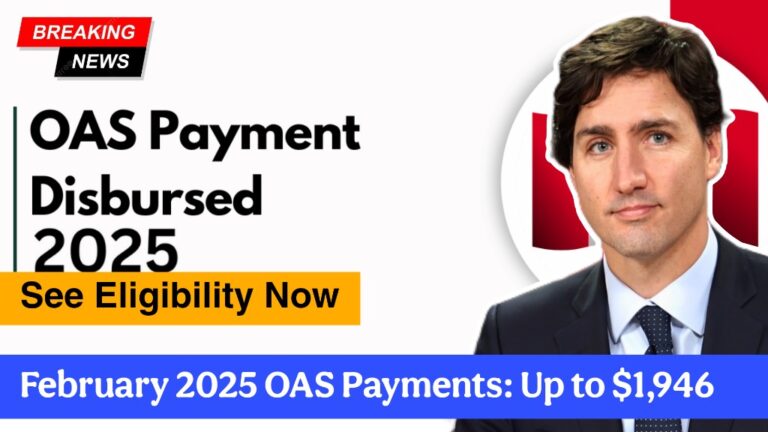USA Visa Interview Rules Changing in April 2025 – Starting April 2025 , the United States will implement stricter visa interview waiver rules, significantly reducing the eligibility window for same-category visa renewals from 48 months to just 12 months . This policy change marks a return to pre-pandemic procedures and aims to enhance security while streamlining the visa application process. Nonimmigrant visa applicants—including those holding B1/B2 (tourist/business) , H1B (specialty occupation) , F1 (student) , and L1 (intracompany transferee) visas—must now adhere to updated guidelines that require them to apply from their home country and meet stricter criteria for interview waivers.
For first-time applicants or individuals with past visa issues, in-person interviews remain mandatory. With increased demand for interviews expected, applicants are encouraged to act early to avoid processing delays. This article explores the new rules, eligibility requirements, preparation steps, and strategies to navigate the tightened visa renewal process effectively.
Table of Contents
- 1 Chart: Key Changes to U.S. Visa Interview Waiver Rules (Effective April 2025)
- 2 Understanding the New Visa Interview Waiver Rules
- 3 Why the Rule Changes?
- 4 Steps to Apply for a U.S. Visa Under the New Rules
- 5 Strategies to Avoid Delays in Visa Processing
- 6 Real-Life Scenarios: Navigating the New Rules
- 7 Broader Implications of the Policy Change
- 8 Conclusion
Chart: Key Changes to U.S. Visa Interview Waiver Rules (Effective April 2025)
| CATEGORY | DETAILS |
|---|---|
| Eligibility Period | Reduced from 48 months to 12 months for same-category renewals |
| Applicable Visa Types | B1/B2, H1B, F1, L1, and other nonimmigrant visas |
| Mandatory In-Person Interviews | First-time applicants and those with prior visa refusals or issues |
| Home Country Requirement | Renewals must be applied for from the applicant’s home country |
| Purpose of Change | Enhance security and return to pre-pandemic procedures |
| Processing Times | Increased demand for interviews may lead to extended processing times |
Note: Applicants with no prior visa refusals or issues may still qualify for waivers under the new 12-month rule.
Also Read: $1,300 Monthly Social Security Cut – Check Eligibility & Date
Understanding the New Visa Interview Waiver Rules
The upcoming changes to U.S. visa policies reflect a broader effort by the Department of State to strengthen national security while ensuring the integrity of the visa issuance process. Here’s what you need to know about the updated rules:
1. Reduced Eligibility Window
- Previously, nonimmigrant visa holders could renew their visas without an interview if they applied within 48 months of their previous visa expiration.
- Under the new rules, this window is drastically reduced to 12 months , meaning applicants must act quickly to qualify for an interview waiver.
2. Same-Category Renewals Only
- The interview waiver applies only to renewals within the same visa category. For example, a B1/B2 visa holder cannot renew as an H1B visa holder without attending an interview.
3. Home Country Requirement
- Renewal applications must be submitted from the applicant’s home country. This rule ensures that consular officers can verify the applicant’s ties to their home country, a key factor in visa approval decisions.
4. No Prior Refusals
- Applicants with a history of visa refusals or other issues are ineligible for the interview waiver and must attend an in-person interview. Exceptions may be granted on a case-by-case basis.
5. First-Time Applicants
- All first-time visa applicants must undergo an in-person interview, regardless of their circumstances. This requirement has remained consistent but is now emphasized alongside the tightened renewal rules.
Why the Rule Changes?
The decision to tighten visa interview waiver rules stems from several factors:
1. Enhanced Security Measures
- The reduced eligibility period allows consular officers to reassess applicants more frequently, ensuring ongoing compliance with visa requirements and mitigating potential security risks.
2. Return to Pre-Pandemic Norms
- During the pandemic, the U.S. temporarily expanded the interview waiver eligibility period to 48 months to reduce in-person interactions and expedite visa processing. The rollback to 12 months aligns with pre-pandemic standards.
3. Increased Demand for Visas
- As global travel rebounds post-pandemic, the U.S. anticipates a surge in visa applications. Tightening the waiver rules helps manage this demand by encouraging timely renewals and reducing backlogs.
Steps to Apply for a U.S. Visa Under the New Rules
Navigating the updated visa process requires careful planning and attention to detail. Follow these steps to ensure a smooth application experience:
1. Check Your Eligibility
- Verify whether you qualify for the interview waiver based on the new 12-month rule. Ensure your visa is expiring soon or has expired within the last year.
- Confirm that you are applying from your home country and have no prior visa refusals unless waived.
2. Complete the DS-160 Form
- Fill out the DS-160 Nonimmigrant Visa Application form online. Provide accurate and up-to-date information to avoid delays or rejections.
3. Pay the Visa Fee
- Pay the non-refundable visa application fee through the designated payment portal. Keep the receipt as proof of payment, as it will be required during the application process.
4. Gather Required Documents
- Prepare the following documents:
- A valid passport (valid for at least six months beyond your intended stay).
- A recent passport-sized photograph meeting U.S. visa specifications.
- Your previous visa (if applicable).
- Supporting documents, such as proof of employment, financial statements, or academic records, depending on your visa type.
5. Schedule an Appointment (If Required)
- If you do not qualify for the interview waiver, schedule an in-person interview at the nearest U.S. embassy or consulate. Be prepared to answer questions about your travel plans, ties to your home country, and purpose of visit.
6. Submit Your Application
- Submit your completed DS-160 form, payment receipt, and supporting documents either online or in person, depending on the consulate’s instructions.
Strategies to Avoid Delays in Visa Processing
With the tightened rules expected to increase demand for in-person interviews, processing times may extend significantly. To minimize delays, consider the following strategies:
1. Renew Early
- If you are eligible for the interview waiver, submit your renewal application well before your current visa expires. Waiting until the last minute increases the risk of falling outside the 12-month window.
2. Stay Organized
- Keep all your visa-related documents in one place and maintain digital copies as backups. This ensures you can quickly access necessary information during the application process.
3. Monitor Consulate Wait Times
- Check the wait times for visa appointments at your local U.S. embassy or consulate regularly. Scheduling early can help you secure a slot before availability becomes limited.
4. Seek Professional Assistance
- If you are unsure about the application process or have a complex case, consult an immigration attorney or visa consultant. Their expertise can help you navigate potential challenges and improve your chances of approval.
5. Prepare for Interviews
- Practice answering common interview questions and gather supporting documents that demonstrate strong ties to your home country. This preparation can boost your confidence and increase your likelihood of success.
Let’s examine two hypothetical examples to illustrate how individuals can adapt to the updated visa policies:
- Maria , a frequent traveler with a B1/B2 visa set to expire in June 2025, decides to renew her visa in March 2025. Since her application falls within the 12-month window and she has no prior visa issues, she qualifies for the interview waiver. By submitting her renewal early, Maria avoids potential delays and receives her new visa without complications.
- John , an H1B visa holder whose visa expired 14 months ago, must attend an in-person interview because he falls outside the 12-month eligibility period. Despite the longer processing time, John schedules his appointment early and prepares thorough documentation, including proof of his continued employment in the U.S. His proactive approach ensures a smooth renewal process.
These examples highlight the importance of understanding the new rules and taking timely action to secure your visa.
Also Read: IRS Confirms $3,379 Average Refund for 2025 – Did You Get Yours?
Broader Implications of the Policy Change
The tightened visa interview waiver rules are likely to impact various groups differently:
1. Frequent Travelers
- Individuals who frequently visit the U.S. for business or tourism must now plan their renewals more carefully to stay within the 12-month window.
2. Students and Professionals
- F1 and H1B visa holders face additional pressure to renew on time, as lapses in visa status can disrupt their education or employment.
3. Consular Workloads
- The increased demand for in-person interviews may strain consular resources, potentially leading to longer wait times and administrative bottlenecks.
4. Global Mobility
- The changes could deter some travelers from applying for U.S. visas, especially those who find the process cumbersome or time-consuming.
Conclusion
The updated U.S. visa interview waiver rules, effective April 2025 , represent a significant shift in how nonimmigrant visas are processed. By reducing the eligibility window to 12 months and enforcing stricter requirements, the policy aims to enhance security and streamline operations. While these changes may pose challenges, proactive planning and adherence to guidelines can help applicants navigate the process successfully.
To ensure a smooth experience, check your eligibility, complete the DS-160 form, pay fees, and prepare all necessary documents well in advance. For those requiring in-person interviews, scheduling early and preparing thoroughly can mitigate potential delays. Stay informed about updates and consult official resources, such as the U.S. Department of State website , for the latest information on visa policies.




